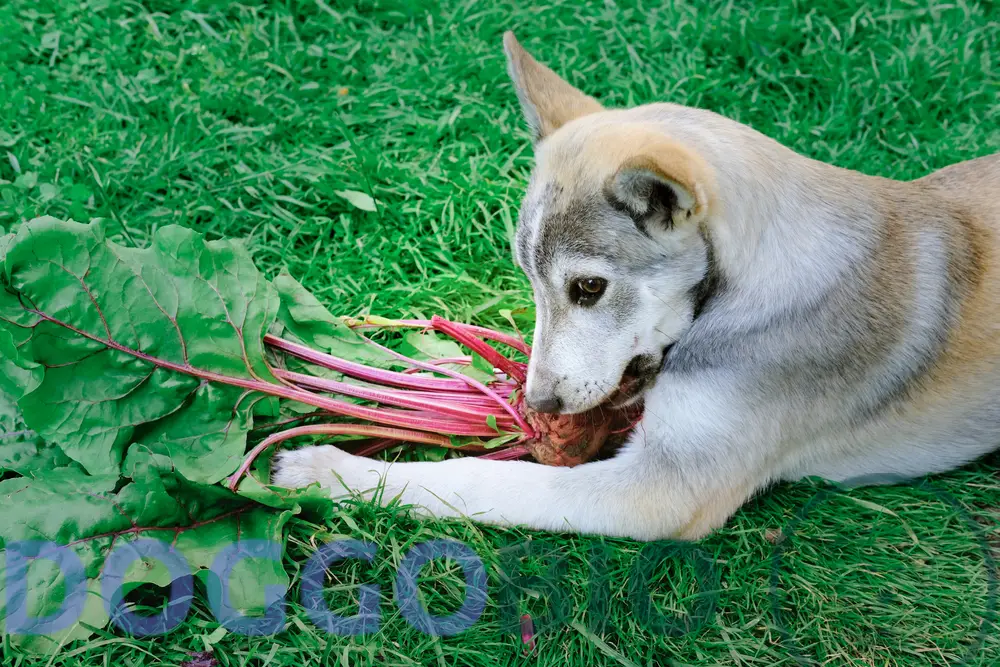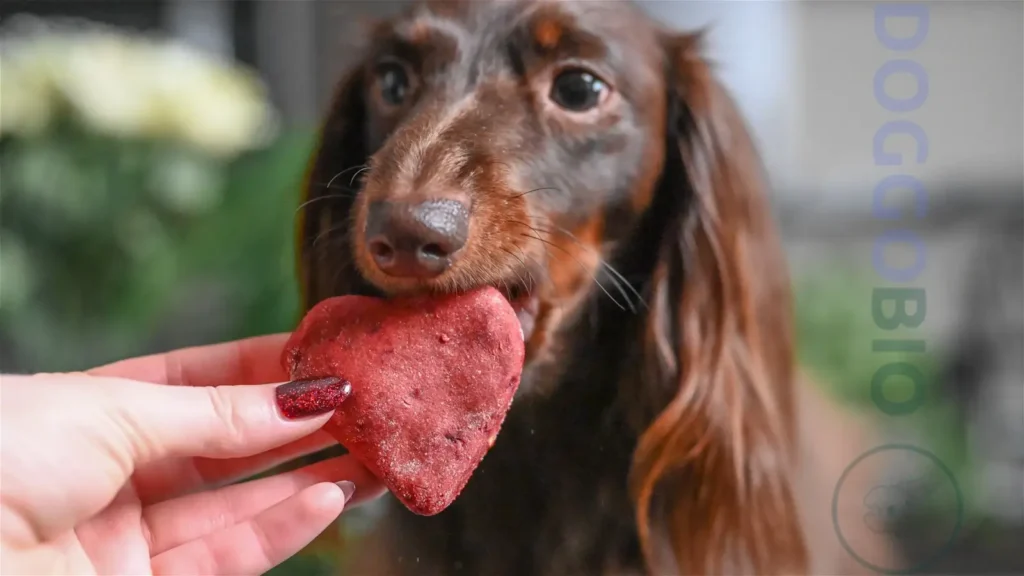As pet owners, we strive to ensure our furry friends are healthy and happy. A significant part of this involves understanding what foods are safe for them to consume.
One common question among dog owners is: “Can Dogs Eat Beets?” This seemingly simple inquiry delves into the broader topic of canine nutrition and the suitability of certain human foods for dogs.
The short answer is yes, dogs can eat beets. Beets are non-toxic to dogs and can be a healthy addition to their diet when prepared correctly. However, like with any human food introduced to a dog’s diet, there are essential considerations to remember.
In the following sections, we will explore the nutritional benefits of beets for dogs, how to safely introduce them into your dog’s diet, and any potential risks or concerns to be aware of.
Can Dogs Eat Beets?

Yes, dogs can eat beets. Beets are considered non-toxic and can be a healthy addition to a dog’s diet. Veterinarians and canine nutritionists generally agree on this.
However, it’s crucial to remember that dogs have different digestive systems and nutritional needs than humans. Introducing beets to a dog’s diet should be done cautiously and in moderation to prevent potential health issues.
Observing how your dog reacts to beets and consulting with a veterinarian for personalized advice is essential, especially if your dog has specific health conditions or dietary restrictions.
The Nutritional Value Of Beets for Dogs
Beets are packed with essential vitamins and minerals that can provide numerous health benefits for humans and dogs. They are low in calories and fiber, making them a great addition to any diet.
Here are some essential nutrients found in beets:
Vitamins
- Vitamin C: Beets are a great source of vitamin C, which helps boost the immune system and promote healthy skin and coat in dogs.
- Folate: This B vitamin is essential for cell growth and development and can help prevent anemia in dogs.
- Vitamin A: Beets contain beta-carotene, converted into vitamin A. This vitamin is essential for maintaining good vision and a healthy immune system.
Minerals
- Potassium: Beets are rich in potassium, which helps regulate blood pressure and maintain proper muscle function.
- Manganese: This mineral plays a role in bone health and metabolism and can act as an antioxidant.
- Iron: Beets are a good source of iron, which is essential for producing red blood cells and preventing anemia.
Potential Benefits Of Beets For Dogs
In addition to being nutrient-dense, beets may offer some potential health benefits for dogs. Here are some ways that beets may positively impact your dog’s health:

Anti-inflammatory properties
Beets contain betaine, a compound shown to have anti-inflammatory effects. This can benefit dogs with conditions such as arthritis or other inflammatory diseases.
Improved digestion
The high fiber content in beets can help regulate digestion and promote healthy bowel movements in dogs. This can be especially helpful for dogs with constipation or diarrhea.
Detoxification
Beets are known for their detoxifying properties, as they contain antioxidants and compounds that help the liver eliminate toxins from the body. This can be beneficial for dogs with liver disease or those who have been exposed to toxins.
Risks of Feeding Beets to Dogs
While beets can offer some potential benefits for dogs, there are also risks to consider before adding them to your dog’s diet.
Here are some things to keep in mind:
High sugar content
Beets are naturally sweet and contain a significant amount of sugar. While this may not be a concern for most dogs, it is essential to monitor their intake if they have diabetes or are prone to weight gain.
Oxalates
Beets contain oxalates, which can bind to calcium and potentially lead to bladder or kidney stones in dogs. If your dog has a history of urinary tract issues, it is best to consult your veterinarian before feeding them beets.
Staining
Beets are known for their vibrant color, which can stain fabrics and surfaces. This may not be a health risk, but it is something to keep in mind when feeding beets to your dog.
How To Safely Feed Dog Beets?
If you decide to incorporate beets into your dog’s diet, it is essential to do so safely and carefully. Here are some tips to follow:

Start small
Introduce beets to your dog’s diet gradually, starting with small amounts and monitoring for any digestive upset. This will allow your dog’s digestive system to adjust to the new food.
Cooked vs. raw
While cooked and raw beets are safe for dogs to eat, they may be easier to digest. Raw beets can be challenging for dogs to chew, so it is best to cook them before feeding them to your dog.
Moderation is key
As with any new food, feeding your dog beets in moderation is essential. Too much food can upset their stomach and potentially lead to health issues.
How Much Beets For Dog?
Determining the right amount of beets to feed your dog depends on various factors, including their size, age, activity level, and overall health.
As a general guideline, small dogs can have a few teaspoons of beet puree, while larger dogs may tolerate up to a couple of tablespoons.
It’s essential to consider beets as part of daily caloric intake to prevent overfeeding. Consulting with a veterinarian can provide more tailored advice based on your dog’s specific dietary needs.
When Can We Discontinue The Use Of Beets?
- Beets should be discontinued from a dog’s diet if they show signs of an allergic reaction, such as itching, hives, or gastrointestinal upset.
- Additionally, if your dog has pre-existing health conditions like kidney stones or diabetes, beets might not be suitable.
Regular health check-ups and discussions with your vet can guide you on whether to continue or discontinue feeding beets to your dog.
Some Posts You Wanna See More
- Can Dogs Eat Black Eyed Peas?
- Can Dogs Eat Bitter Melon?
- Can Dogs Eat Bean Sprouts?
- Can Dogs Eat Banana Peppers?
- Can Dogs Eat Artichokes?
- Can Dogs Eat Amaranth?
- Can Dogs Eat Brussels Sprouts
Frequently Asked Questions
Can Dogs Eat Beet Greens?
Yes, beet greens are safe for dogs to eat. They are a good source of fiber and contain many of the same nutrients as the beetroot.
Can Beets Cause Allergies In Dogs?
No, Beets are not known to be a common allergen in dogs, but as with any new food, it is essential to monitor your dog for any signs of an allergic reaction.
Can Puppies Eat Beets?
Yes, Puppies can safely eat beets, but it is best to introduce them gradually and in small amounts to avoid any digestive upset.
Are Canned Beets Safe For Dogs?
No, Canned beets may contain added sugars and preservatives, which can harm dogs. It is best to stick to fresh or cooked beets when feeding them to your dog.
Can Dogs Eat Pickled Beets?
No, Pickled beets often contain high amounts of salt and vinegar, which can harm dogs. It is best to avoid feeding pickled beets to your dog.
Conclusion
In summary, the answer to “Can Dogs Eat Beets?” is yes, but moderation is key. Beets can offer nutritional benefits to dogs, but they should be given as a treat, not as a dietary staple.
Always introduce beets slowly into your dog’s diet and ensure they are plain and unseasoned. Consult your vet for personalized advice, especially for dogs with specific health conditions. With these precautions, beets can be a safe and enjoyable addition to your dog’s diet.

Pingback: Can Dogs Eat Brussels Sprouts? Discover Risks & Benefits 2024